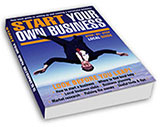


Whether you have identified a gap in a market, are planning to start from scratch, buy an existing business, or take on a franchise, you need to make sure that the idea is viable and this section is designed to help you consider your options.
While you are full of early excitement, it is normal to want to get started as quickly as possible, and there are many good reasons for doing so (for example you need find out whether customers want want you are selling as soon as possible!). However, if you have the time (and the patience), it is worth setting up the right way rather than have to put things right later.
We have listed the key considerations below, so at very least, you will have a general overview of what you are letting yourself in for!
"You don't know what you don't know!"; Plot your progress with this 125+ point checklist and make sure that you have considered all the key factors prior to starting your business. There are so many things to think about in the early stages, it is easy to overlook something if you are not careful. We hope that his simple tool will prevent that form happening.
This 180 page book is packed with start-up information and resources which we hope will help you start your business as smoothly as possible. It contains chapters on all of the key subjects, hints and tips, useful contacts, and even some stories which we hope will make you smile. You can download the whole book now (free of charge).
Think very carefully about your strengths and weaknesses and be honest with yourself. You are unlikely to be able to do everything yourself - certainly not effectively. A successful business requires sales, administration, accounting, and strong marketing, as well as the core trade/product/idea/profession. The way to succeed is to 'do all the bits that you can do well, and get help for the rest'.
Setting up something completely new can be extremely exciting - but challenging. In addition to your core skill, you will have to quickly get to grips with many more tasks which in corporate life are handled by somebody else. With so many different things to think about, it can be easy to overlook something.
Buying an existing business is a good way to leapfrog much of the set up process. Although the cost of purchase may be higher than if you started from scratch, you do gain a trading concern from day one and should be able get a realistic idea of the potential turnover/profits from the audited accounts.
Franchising is the granting of a license by one person (the franchisor) to another (the franchisee), which entitles the franchisee to trade under the trademark/trade name of the franchisor in exchange for a fee.
There is a difference between what the law requires you to do in order to start a new business and, depending on your own experience, what you ought to do in order to stand the best chance of thriving. We have tried to cover both and you can learn more about what the law requires: tax Status, legal entity, insurance, permits).
When you are excited about the prospect of starting your business, the planning stage can seem tiresome, however I cannot overstate the importance of this part of the process. Researching your idea thoroughly, preparing a business plan, and a cash flow forecast are vital components of a SUCCESSFUL business (even if you do not need to approach a lender for money - remember, this is for YOU). Simply going through the exercise will serve as a great reality check and will ensure that you have at least thought about all of the key considerations.
Time spent on researching will be valuable - whatever you discover. Do not be afraid to find bad news. It is better to uncover direct competition or flaws in your plan at this early stage rather than when it is likely to cost you real money. Use the internet, books, magazines, trade press, and libraries. Talk to business advisors, friends, relatives, and other business people.
Top tip. Learn as much as you can about your competition or how similar businesses work in other areas (there is no better way to find their strengths and weaknesses).
There are plenty of sites on the web offering to sell you sample plans but be wary before parting with any cash. Some of the more sector specific examples may be useful, but you should be able to find free templates. Alternatively, your bank or accountant will almost certainly be able to offer you one without charge.
Free Business Plan TemplateGet our FREE easy to use business plan template - with instructions!
Sadly, money rarely comes in or goes out at the most convenient time (for example you may have to pay for your stock before you can sell it). A cash flow forecast will help you work out roughly what you can expect financially in the future - even if some of it will have to be based upon guesswork. This is vital information, particularly if you are planning to borrow money - it is best to plan for the maximum amount that you will need rather than having to keep going back to your lender asking for more.
Free Cashflow Forecast Template and InstructionsGet our FREE Cashflow Forecast and Instructions.
Top tip! Most businesses have peaks and troughs - planning ahead will help you survive the quieter times. A landscape gardener may be well advised to save some of his summer income to carry through the winter months when work could be harder to find. How does this relate to you?
Networking is a great way to make new business contacts (and to put on weight). Often run as breakfast, lunch or social events, it is an opportunity to get to know other local business people and if handled correctly, may ultimately lead to more custom. There will be many formal and informal networks near you. Your local Chamber of Commerce may be a good starting point but there are also plenty of national and local networks and it is a good idea to try a few to see which suit you best before committing to a joining fee.
Free guide to successful networkingA simple to follow guide to networking written by Stef Thomas, author of 'Networking for Dummies'.
Making sure that you are completely prepared for 'take off' involves a great deal of thought and planning. The more that you can do in advance, the more time that you will have later to concentrate on actually running the business.
Free Business Plan TemplateGet our FREE easy to use business plan template - with instructions!
Top tip! This is an exciting stage and enjoyable because it is completely within your control and usually involves making other people happy by giving them money. However, do not get carried away with expenditure and never let the planning distract you from thinking about where your income is going to come from.
It is often harder to name a new business than we think. It seems like you should be able to come up with something catchy and run with it, but it isn't that simple. You must investigate the possibility that someone else has already chosen the name, and, if so, what their rights are to use it in the area/market you will be serving. Look in your local directories, underrtake a Google search, and check to make sure that your domain (website) name is available.
Keeping track of income and expenditure is vital to the financial health of any business, as is complying with the demands of the revenue! Careful planning, book-keeping and compiling annual accounts are often best left to someone with the required experience and skills - an accountant or qualified book-keeper. If you operate a profitable business, a good accountant will save you a lot of aggravation and possibly money too! The tax laws are complex and accountancy fees can sometimes be covered by their knowledge of how to legally minimise the amount of tax that you have to pay.
Shop around (personal recommendations are best). Always agree fees in advance. Do not be tempted by offers of 'creative' accounting to save you tax - HMRC deal with enough accountants to know the good from the bad and who is most likely to be 'trying it on'!
Unfortunatley, if you make a profit, the 'taxman' will want his share. Make sure that you understand the rules and regulations that surround this prickly subject.
There are a number of key dates that you must remember, but these vary depending upon the legal status of your business and whether or not you employ staff.
Value Added Tax (VAT) is a tax on certain goods and services supplied in the UK. At the moment, you only have to register for VAT when your 'taxable turnover' is more than the current threshold (see: gov.uk/vat-registration-thresholds).
Almost everyone who works for a living pays N.I. It goes toward pensions, benefits and healthcare. Class 2 NICs are payable by anyone who is self-employed.
Class 2 National Insurance is a fixed weekly amount, paid by monthly direct debit or quarterly bill. When you register as self-employed, you will also fill in the Class 2 direct debit form. See: gov.uk/self-employed-national-insurance-rates
Class 4 NICS are payable by most self-employed people. They are a percentage of your annual taxable profit from self-employment, but you only start paying Class 4 when your profits reach a certain limit. You pay your contributions along with your income tax using the Self Assessment tax return.
If you are in a partnership, or if your spouse is self-employed too, then each person pays their own Class 4 NICs.
If you are an employer, then you will also have to pay Class 1 - and possibly Class 1A or Class 1B - on employees' wages.
There are numerous areas of the Law that may prompt you to seek professional legal assistance. Examples can include: company/commercial issues, commercial agreements/contracts, company and business sales and purchases, company formation/business start-ups, contract advice, joint ventures, mergers, acquisitions and disposals, minority shareholder rights, partnership agreements, raising capital, share schemes, shareholder agreements, terms and conditions of business, restructuring your business, agency & distribution agreements, franchise agreements, commercial property issues.
Find a Solicitor. Run by the Law Society, Find a Solicitor is a free service for anyone looking for information about organisations or people providing legal services in England and Wales that are regulated by the Solicitors Regulation Authority (SRA).
In a well set up office, the equipment, the systems and the environment all contribute to making you and your business more efficient. Instead of cobbling your office together as you go it is far better to plan it properly from the start.
With most people, starting a new business means investing blood, sweat and tears into their new idea and working hard to see it grow into something to be proud of. It usually also means investing a fair amount of money. If this hard earned cash is invested in the wrong area it can quickly disappear. This is particularly relevant when it comes to IT. Neither the hardware, software nor support come cheap and if you get it wrong you can suddenly find a large hole in your finances replacing the wrong systems. Carefully consider what you are likely to need to support your immediate and future needs.
Your business space should be planned carefully, as the right equipment and furniture will not only save you time and effort, but money, too. Old or inconvenient furniture results in a messy workspace, loss of productivity and can eventually lead to back or wrist pain. When you depend on yourself for your income, any time you are not working to your full productivity, you are losing money.
Advances in technology have dramatically changed the way that we communicate with each other. Mobile phones, broadband and wireless technology all have a part to play in a successful modern business.
There is a massive cost difference between buying small and large quantities of stationery. Calculate what you are likely to need to cover you for a reasonable period and then shop around. Compare local wholesaler's prices as well as internet/mail order.
For peace of mind, please carefully consider whether your business needs insurance. It is one of those costs that sometimes can be 'saved' but then prove costly later.
The types of insurance that may be applicable are: Public Liability (essential if you are dealing with members of the public), Employers Liability, Professional Indemnity, Key Man, Director's Insurance, Equipment, Buildings & Contents Cover, Motor Insurance, Goods in Transit, Legal Expenses Insurance. Speak to a reputable broker if you are in any doubt.
If you are thinking about employing a member of staff for the first time, it is worth considering the legal, health & safety, and taxation implications. This is a major step, which requires personal and financial commitment. It is therefore vital that you are fully aware of the benefits and the potential pitfalls before advertising your first vacancy.
There is plenty to think about if you want your business to stand the best chance of success. Many of the topics touched upon in this section are explained in more detail elsewhere on the site - simply follow the relevant links. However, we would strongly recommend that you make the most of the professional business advice - much of which is free - that is available.





